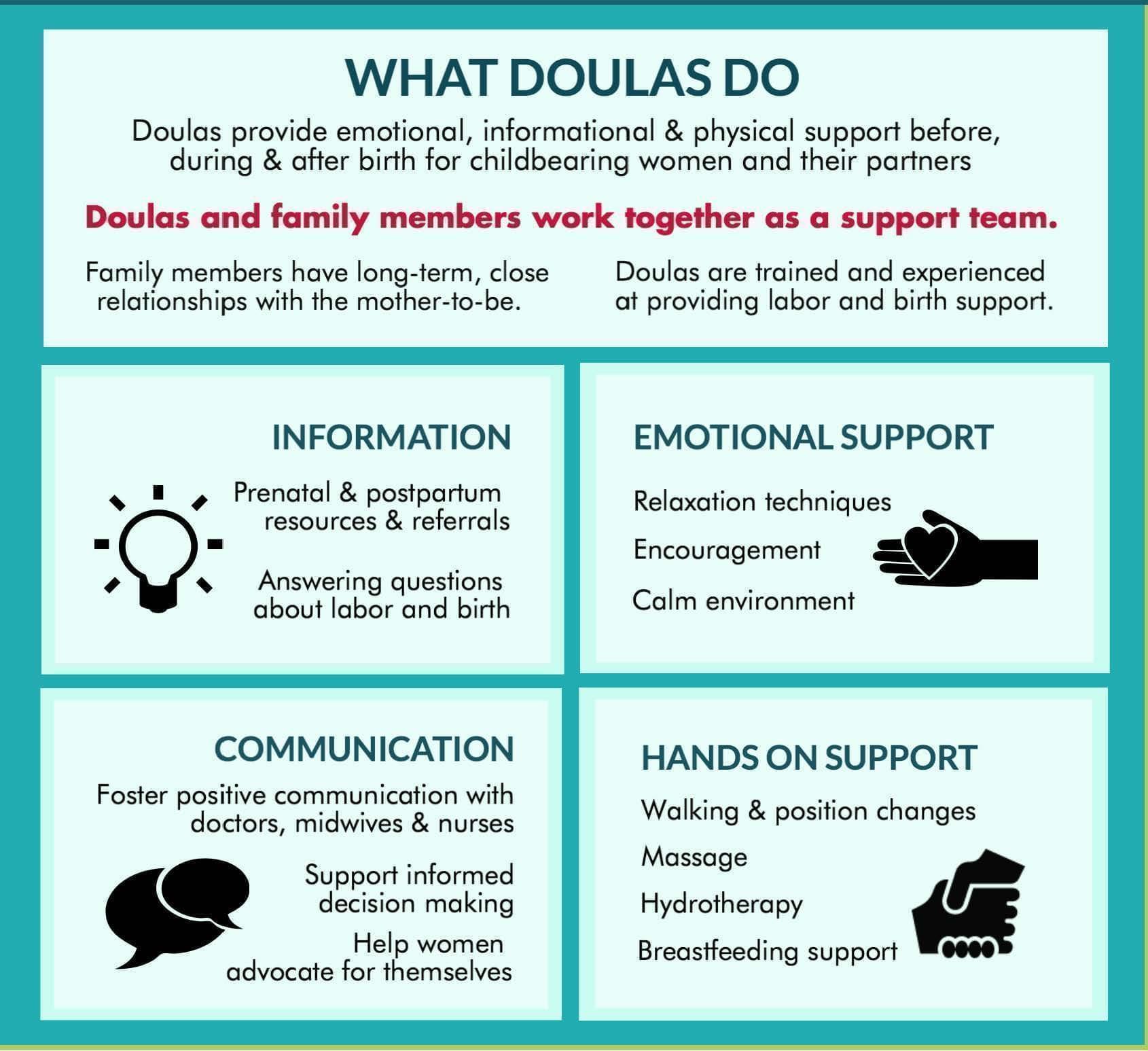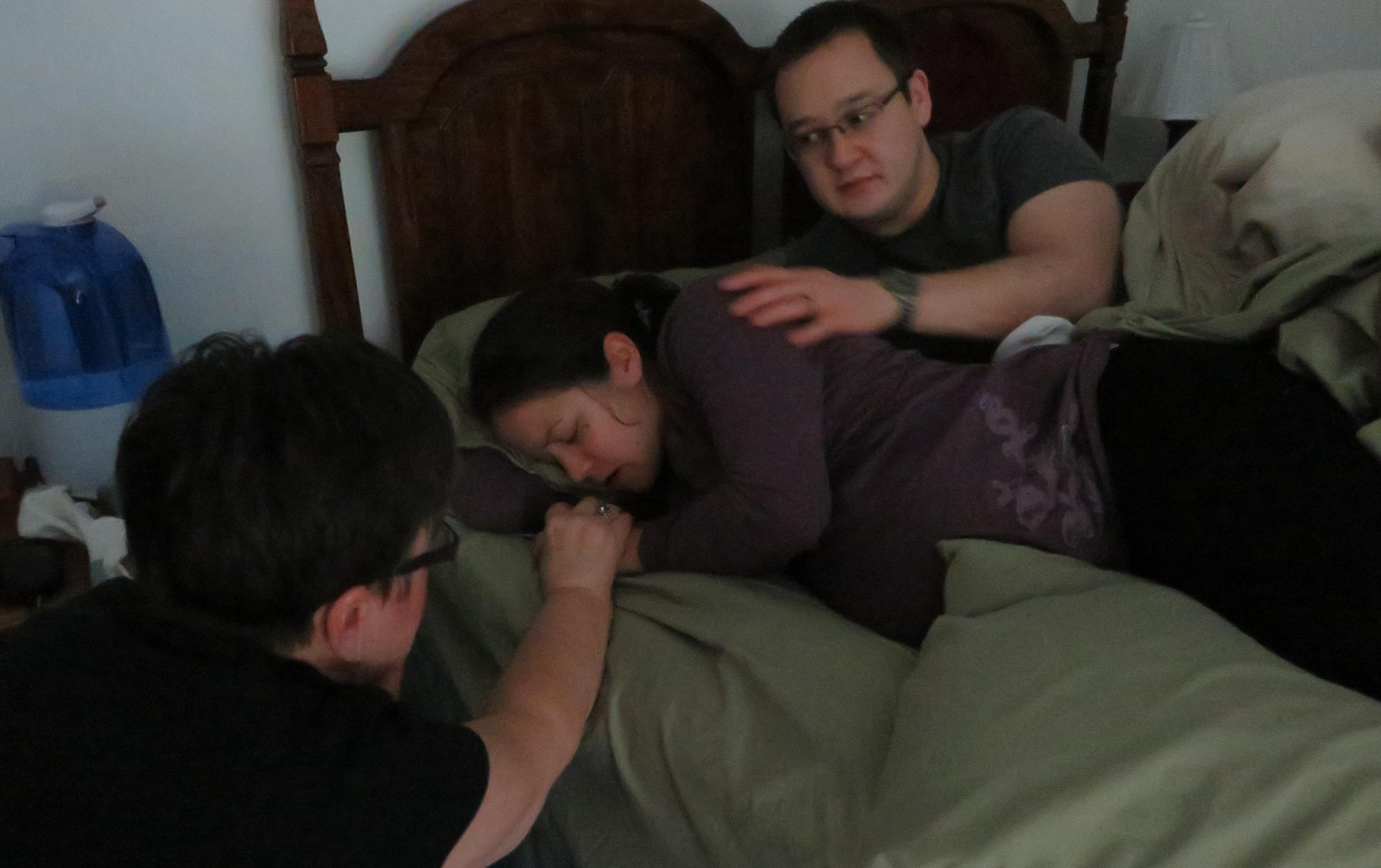Maternal Health Advocates Urge Insurers To Cover Costs Of Birth Doulas

Christine Herman holds her daughter moments after her birth at Carle Foundation Hospital in Urbana. Sue Osborne
A new study finds that women who receive continuous support during labor from a certified doula have lower rates of pre-term births and C-sections, with demonstrated cost savings to Medicaid. And yet, most insurance companies don’t cover the service. Now, two organizations that advocate for safer maternity practices are pushing for change.
“The word doula actually is a Greek word, literally meaning servant or slave,” says Sue Osborne, a doula who has attended more than 300 births in Champaign-Urbana over the past ten years. “It's come down through the generations to mean a woman serving another woman in labor.”
Last year, Sue Osborne supported my husband Geoff and I through the birth of our daughter. She coached me through every single contraction, and held my hands while my husband applied a heating pad on my back. And when it was clear that it was time to leave for the hospital, she let us know.
It was reassuring to have Sue there, reminding me through the most excruciating pain of my life, that it was just a matter of time before I’d be holding my baby girl in my arms.
As it turns out, there’s mounting evidence in the scientific literature that supports the use of doulas for improving birth outcomes. On average, women supported by doulas have shorter labors and are nearly 30 percent less likely to have a C-section. To put that into context, one out of five doula-assisted births are likely to end in a C-section, compared to one in three without a doula.

Other benefits include a 9 percent reduction in the use of any pain medications, a 31 percent reduction in the use of synthetic oxytocin to speed up labor, and a 34 percent reduction in reporting a negative birth experience, according to Carol Sakala from the National Partnership for Women and Families. Sakala is part of a research team that co-authored a meta-analysis back in 2012 that systematically reviewed 22 trials involving more than 15,000 birthing women. The study is cited in a consensus statement that was issued in 2014 by two leading medical societies – the American Congress of Obstetricians and Gynecologists (ACOG) and the Society for Maternal Fetal Medicine, calling doulas “one of the most effective tools to improve labor and delivery outcomes” with “no associated measurable harms.”
Dr. Maura Quinlan, the Illinois Chair of ACOG, says the evidence in support of doulas is indeed strong. “I think that doulas certainly can help, especially for high-risk women who don’t have as much support perhaps with them,” such as teen mothers who might otherwise be laboring alone.
Which begs the question – why aren’t doulas more common? To answer that question, Sakala quotes the late pediatrician and champion for doula care, John Kennell as saying, “If a doula were a drug, it would be unethical to withhold it.” While drug companies have enormous resources for getting new medications and tests into hospitals, the same is not true for doula advocates. “We don't have a similar kind of effective corporate interest in making doula care widely available,” she says.
Right now, only about 6 percent of births in the U.S. are attended by doulas, which may not come as a surprise, given that few insurance companies cover them and the out-of-pocket costs can range from a few hundred to a couple thousand dollars.
“It has been a service that has simply been out of reach for the vast majority of the population,” says Nan Strauss is the director of policy and research at Choices in Childbirth.
That’s something Strauss and Sakala would like to change. Earlier this month, their organizations published a brief urging insurers, and Medicaid in particular, to include coverage of birth doula services.
“That's going to give more women access to what we have thought of as a boutique service that goes along with your espresso maker and … your fancy vacation or whatever,” Strauss says. “But in fact, that's not the case. Doula support is not a luxury for a small percentage of the population. It's really a basic support service that has real health benefits that can be long-lasting. And as such, every woman deserves to have evidence-based care.”
If improving birth outcomes isn’t enough motivation, Sakala says insurance companies that cover doula services are likely to save money in the end, since C-sections can cost nearly twice as much as vaginal births.

Sue Osborne coaches Christine and Geoffrey Herman through the early stages of labor. Sue has attended more than 300 births since she began her doula career roughly ten years ago.
Dr. Quinlan agrees that doulas should be a covered service. She says her experiences caring for patients with doulas have been largely positive, but she would like to see some measures put in place to ensure mutual respect and collaboration between doulas and hospital staff.
“There are some doulas who are distrustful, not respectful of the medical system, and are really tough because any time any decision is made, some doulas, encourage the woman to refuse intervention or refuse whatever that is medically necessary for her and her baby,” Dr. Quinlan says.
In response to such concerns, Strauss says states can put safeguards in place to limit Medicaid reimbursements only to doulas with a certain level of training and experience, which would ideally ensure doulas not overstep their bounds as nonmedical care providers.
Coverage for doula services by Medicaid became possible – at least theoretically – in 2013. That’s when the Centers for Medicare and Medicaid Services announced a provision that would allow states to cover so-called “preventive services” from non-licensed professionals. So doula services could be covered as long as they’ve been recommended by a licensed physician or midwife.
But even with this provision, Sakala says progress toward getting doula services covered by Medicaid has been slow. “There's no great billing code for this purpose,” she says.
So far, two states – Minnesota and Oregon – have passed laws that should make it possible for doulas to be reimbursed for their services to Medicaid clients. And in a study published last week, researchers found that publicly insured women in Minnesota who received doula support had lower rates of pre-term births and C-sections, with a demonstrated overall cost savings to Medicaid of roughly one thousand dollars per birth.
For Medicaid patients in Illinois, families desiring a doula have to foot the bill alone. John Hoffman, spokesman of the Illinois Department of Health Care and Family Services, declined an interview but said in an email that doula services are not currently covered, and he’s not aware of proposals to add them.
But teen mothers in Vermillion County may be able to gain access to doula support through the Center for Children’s services in Danville. “We know that mothers who are young in age, and who are pregnant and come from low-income families, that they lack support a lot of times,” says Amber Cundiff, manager of Parents Too Soon, a federal- and state-funded program which started in 2004, and last year, served 30 teen mothers.
In Urbana, Carle Foundation Hospital once had an in-house doula program. That’s where Sue, my doula, began her career over a decade ago. She says the program used a sliding scale to make doulas affordable for families with financial need, but it ended in 2005 when the grant money supporting it ran out.
The day after my daughter’s birth, Sue came back to the hospital, and we talked about how everything went. “Geoff told me, he’d seen a woman he’d never seen before,” she said. “You know how strong women are when you watch them do something like that. You’re a strong person. You’re powerful. And I hope you feel good about how you labored.”
I did feel good about my labor. And while I can’t know for sure how differently things would have gone without Sue there, the data support the notion that having a doula can make a difference.
Efadul Huq contributed reporting. This story is the result of an ongoing collaboration between WILL and journalism faculty at the U of I College of Media.
Links
- As US Home Births Increase, Options for Illinois Women Limited
- Home Birth and Midwifery in Illinois
- After C-section, Bloomington Couple Opts for Home Birth
- Home Birth is Planned Gathering of Friends & Family for Towanda Couple
- Champaign Dad Delivers Daughter in Planned Home Birth with Help from Internet

